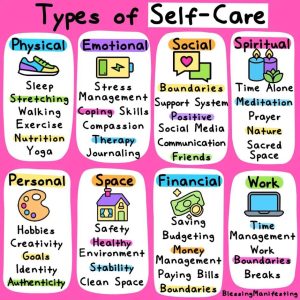The Importance of Self-care for our Mental Health and Wellbeing

I absolutely love this infographic from the article “Types of Self-Care You need to Know” on BlessingManifesting.com as a helpful starting point to think about the different facets of your life that might need more attention and care, and some ideas on potential focus points in each domain.
In our culture of busyness and information overload (on topics such as being the BEST parent/student/son/daughter/employee/athlete/performer we could possibly be, etc.) there is often a misconception out there that self-care is selfish or overindulgent. However, the fact of the matter is that we cannot pour from an empty cup and in order to be fully available for the significant others in our lives, we need to focus on filling our own cups first.
Therapist Aid (© 2020 TherapistAid.com) provides the following tips on self-care:
Self-care means taking time to do things you enjoy. Usually, self-care involves everyday activities that you find relaxing, fun, or energizing. These activities could be as simple as reading a book, or as big as taking a vacation.
Self-care also means taking care of yourself. This means eating regular meals, getting enough sleep, caring for personal hygiene, and anything else that maintains good health.
Make self-care a priority. There will always be other things to do, but don’t let these interrupt the time you set aside for self-care. Self-care should be given the same importance as other responsibilities.
Set specific self-care goals. It’s difficult to follow through with vague goals, such as “I will take more time for self-care”. Instead, try something specific, such as “I will walk for 30 minutes every evening after dinner”.
Make self-care a habit. Just like eating one apple doesn’t eliminate health problems, using self-care just once won’t have much effect on reducing stress. Choose activities that you can do often, and that you will stick with.
Set boundaries to protect your self-care. You don’t need a major obligation to say “no” to others — your self-care is reason enough. Remind yourself that your needs are as important as anyone else’s.
A few minutes of self-care is better than no self-care. Set an alarm reminding you to take regular breaks, even if it’s just a walk around the block, or an uninterrupted snack. Oftentimes, stepping away will energize you to work more efficiently when you return.
Unhealthy activities don’t count as self-care. Substance use, over-eating and other unhealthy behaviours might hide uncomfortable emotions temporarily, but they cause more problems in the long run.
Keep up with self-care, even when you’re feeling good. Doing so will keep you in a healthy routine. Plus, self-care might be part of the reason why you’re feeling good!
In our Student Services space, we often hear from students who feel guilty about resting and taking some time off in the afternoons. Often students mention that they don’t want to “waste their parents’ money” paying for their education, so they can’t take breaks to go on a walk or go to the gym. The end result might be a student sitting in front of their books, but not taking much in, whereas, if they were to take a physical ‘brain break’ they could come back more refreshed and ready to learn much more efficiently, leading to better academic outcomes in the long run. Self-care can furthermore contribute to avoiding burnout, anxiety and depression, and therefore needs to be prioritized. Parents can model prioritizing their own self-care and have conversations with their children about the various types of self-care. Feel free to use the above visual as a conversation starter!
For further Mental Health Services and Support please click here
Until next time.
Marisa Smit
CGS Psychologist

 1143
1143












